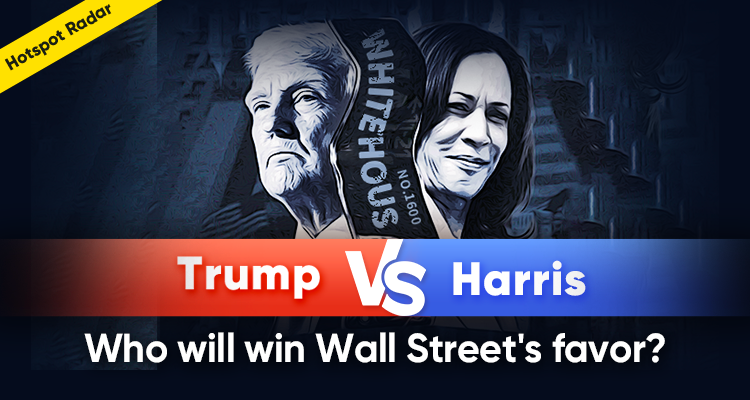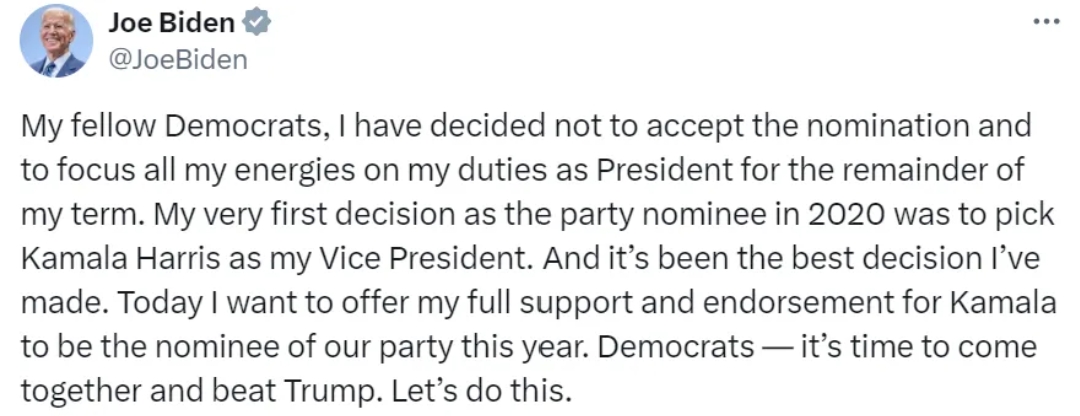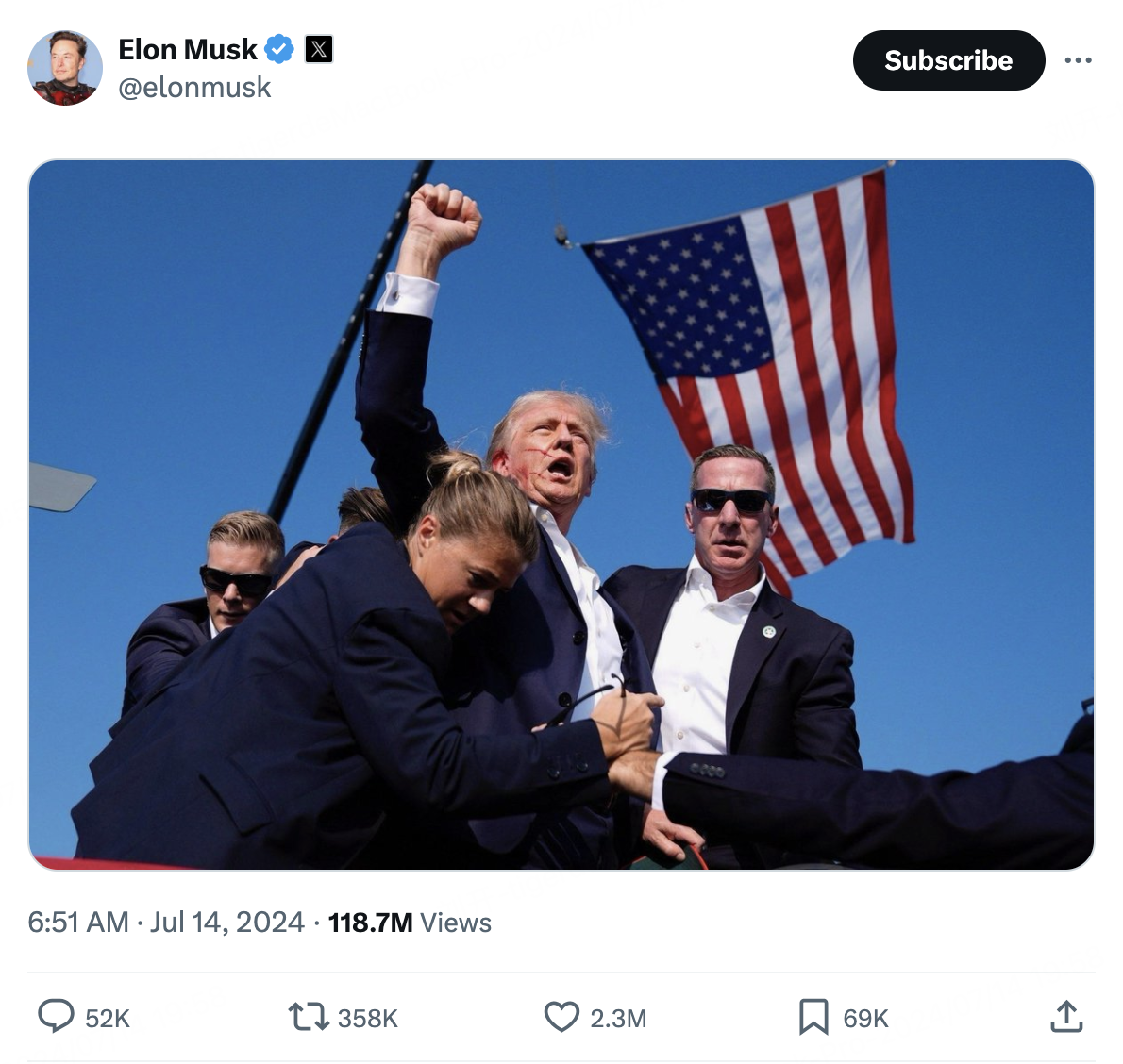
As the US presidential election approaches, the debate between Vice President Kamala Harris and former President Donald Trump has become a hot topic in the market. Currently, Harris leads Trump by 6 percentage points with a 52% approval rating among potential voters.(data: wsj.com)
The two candidates clearly differ in their positions on tax, financial regulation, and economic stimulus policies, which will directly affect the Federal Reserve's interest rate decisions and stock market trends.
Debate strikes again
Former US President Donald Trump announced on August 27, Eastern Time, that the debate with Harris had been scheduled for September 10. This debate will be hosted by the American Broadcasting Company (ABC) and held at the National Constitution Center in Philadelphia, Pennsylvania.
Debate expectations
Some media outlets believe that Trump's performance in the debate largely depends on whether he can effectively attack Harris's policies, especially on key issues such as the economy and immigration.
If Trump can gain the upper hand in these areas, he may further consolidate support among conservative voters (Hindustan Times). If Harris can calmly and clearly counter Trump's attacks while showcasing her policy strengths, she could gain the support of moderate and undecided voters. (WHYY).
Impact on the Election
The outcome of the debate will have a certain impact on the election, especially in terms of voter enthusiasm, the choices of undecided voters, and economic issues. However, the extent of this impact still depends on the candidates' performance in the debate and subsequent media coverage. Although the debate outcome does not necessarily directly determine the election results, it could be a decisive factor in key swing states and voter groups.
*citations:
https://www.hindustantimes.com/world-news/us-news/trump-and-harris-reach-agreement-for-abc-debate-ex-prez-says-in-fiery-truth-social-post-101724792535298.html
https://whyy.org/articles/september-10-debate-donald-trump-kamala-harris/
Showdown on economic policy
Kamala Harris: Towards universal welfare, interest rates may struggle to fall
Harris advocates for large-scale public investment to promote economic growth, especially in areas such as infrastructure, education, and healthcare. While this expansionary fiscal policy can contribute to long-term economic stability, it may lead to short-term inflationary pressures, which could prompt the Federal Reserve to sustain or increase interest rates.
Tax Policy:
Harris advocates for increased taxes on high-income individuals and large corporations, particularly those with annual incomes over $400,000 and capital gains. This may put pressure on some high-net-worth individuals and large corporations.
Government Spending and Fiscal Policy:
Harris supports increasing government spending on infrastructure, healthcare, and education to achieve more equitable economic distribution and long-term economic growth.
Trade Policy:
Harris supports reforming the global trade system through international cooperation, especially in protecting workers' rights and the environment. This means she may adopt a more balanced attitude in trade negotiations with countries like China.
Employment and Labor Policy:
Raising the minimum wage and union rights, Harris supports increasing the federal minimum wage and expanding the influence of unions, which may increase labour costs for businesses, especially in the service and manufacturing sectors.
Healthcare Policy:
Supports expanding the Affordable Care Act and introducing universal healthcare, which may increase government regulation and costs in the healthcare industry.
Energy Policy:
Similar to Biden's stance, Harris supports the development of new energy, eliminating subsidies for oil and gas, and expanding the clean energy workforce.
Digital Currency:
Advocates for stricter regulation of digital currencies, focusing on consumer protection, financial stability, and money laundering risks. Harris has not yet expressed a clear position on cryptocurrencies, but her campaign team has been in contact with the crypto community, indicating a potentially open attitude towards this field.
Donald Trump: Tax cuts are back, can the bull market continue?
In contrast, Trump's economic propositions continue his previous style: tax cuts and deregulation.
Tax Policy:
Trump favours maintaining low tax policies, including maintaining or further reducing corporate tax rates. His policy emphasises stimulating investment and economic growth through tax cuts.
Government Spending and Fiscal Policy:
Tends to reduce government spending on social welfare and public projects while increasing spending on defence and security. His policy emphasises reducing government intervention and relying more on market forces.
Trade Policy:
Trump's "America First" policy emphasises protecting American manufacturing through tariffs and bilateral agreements, which may lead to increased tensions with major trade partners, especially with China.
Employment and Labor Policy:
Reducing labour regulations, Trump opposes the federal government setting higher minimum wage standards and favours reducing labour regulations to increase business flexibility and reduce hiring costs.
Healthcare Policy:
Strongly opposes universal healthcare, and supports market-oriented healthcare reform to reduce the government's role in healthcare.
Energy Policy:
Trump supports fossil fuels and opposes new energy, advocating for the removal of restrictions on American energy production.
Digital Currency:
Trump has a completely supportive attitude towards digital currencies, advocating for the removal of government regulation of digital currency transactions.
What does Wall Street say?
Wall Street has different opinions on the policy directions of the two candidates and has begun to adjust strategies to cope with possible election outcomes.
UBS's wealth management department recently stated that they believe Harris has the highest chance of winning in the context of a divided Congress. This means that even if Harris is elected, her policy implementation will be checked by Congress, which may alleviate market concerns and reduce short-term shocks to the stock market.
At the same time, Goldman Sachs has reassessed the election outcome. Although Goldman Sachs previously believed that a Republican landslide was the most likely result, they have adjusted their trading strategies in response to changes in the election situation, reflecting a reduced likelihood of a Republican landslide.
*Source: wsj.com
If Trump makes a comeback
Financial Regulation
Traditional Energy and Oil
Automotive
Technology
Cryptocurrency
If Harris takes the lead
Clean energy
Infrastructure
Healthcare
Technology and education
Environmental and sustainability
Construction and real estate
Electric vehicles
Consumer retail
Financial technology
Previous progress
On July 21, local time, President Joe Biden announced his withdrawal from the 2024 presidential race. Biden stated that he made the decision in the best interest of the Democratic Party and the United States, and will fully support and endorse Vice President Kamala Harris for the Democratic presidential nomination.
Biden Drops Out!Harris Takes Over
On July 21, local time, U.S. President Joe Biden announced his withdrawal from the 2024 presidential election.

*Picture source:X
In a letter posted on his personal social media on the same day, Biden stated that he had initially intended to seek re-election. However, in the best interest of the Democratic Party and the United States, he has decided to withdraw from the presidential race and will focus on fulfilling his duties as President. He will fully support and endorse Vice President Kamala Harris for the Democratic presidential nomination.
After Biden's announcement of withdrawal, Trump commented on social media that Biden was unfit for re-election. He believes that if Harris secures the party nomination, she will be "easier to defeat than Biden" in the November election. Currently, Trump's campaign team is preparing for a contest against Harris.
The Impact of Harris Taking Over
If Harris successfully take the White House, it would mean that the "political pendulum has swung a bit back, leaning more towards the progressive wing."
1⃣️ Stock Market:
- J.P. Morgan: Believes that Harris's policies could lead to a rise in technology stocks, particularly in the renewable energy and healthcare sectors, due to her support for renewable energy and healthcare reform. Companies like Tesla, Nikola, and FirstSolar are expected to perform above average, while oil and gas companies like Apache and Pioneer Natural Resources may underperform.
- Goldman Sachs: Anticipates initial market volatility but remains positive on technology and green energy sectors in the long term.
2⃣️ Foreign Exchange Market:
- Citigroup: Suggests that Harris's foreign policy might lead to a weaker dollar due to her inclination towards more open international trade.
- UBS: Predicts that the dollar may experience short-term fluctuations, depending on the specifics of policy implementation.
3⃣️ Bond Market:
- BlackRock: Forecasts that under Harris's leadership, bond yields may rise due to her support for large-scale infrastructure investment plans.
- Vanguard: Expects that expansionary fiscal policies could lead to higher long-term government bond yields, but with limited short-term impact.
The Trump Attack Scene
At around 6:15 PM on July 13, Trump was at a campaign rally in Butler, Pennsylvania, when a suspected gunman fired several shots at the stage from a high vantage point outside the rally venue. Photographers captured images of subtle bloodstains on Trump's face and the ensuing chaos. According to preliminary determinations by on-site FBI investigators, the suspect in the assassination attempt was 20-year-old Thomas Matthew Crooks, a Republican from Pennsylvania, with motives still under investigation. Crooks was subsequently killed by the US Secret Service.

*Picture source:X
Trump's conduct at the scene was praised by the media. He left the scene under the protection of security personnel and gestured to his supporters. According to traders from the market prediction platform Polymarket, after the incident, the betting on whether Trump would win the presidential election increased by 10 cents, reaching 70 cents, indicating that investors now believe Trump has a 70% chance of winning in November.

*Picture source:Polymarket
Impact of the Trump attack on the market
US presidents have faced multiple assassination attempts. On March 30, 1981, Ronald Reagan was shot in Washington but survived. The stock market closed early that day due to the assassination attempt, with the S&P 500 index slightly down. The next day, the S&P 500 index rose by more than 1%, and the 10-year US Treasury yield fell by 9 basis points. Market commentators believe that the "Trump concept" will increasingly attract market attention, with funds betting on the Republican Party and Trump's victory. BCA Research's chief strategist Marko Papic believes that US Treasuries are the assets most affected by Trump's policies, and the US Treasury market may fluctuate as a result.
Trump is a supporter of cryptocurrencies and has stated that he will speak at the Nashville Cryptocurrency Conference in July. Tokens related to Trump saw significant increases, with MAGA rising by 34% and TREMP increasing by 67% within 24 hours.
Impact of the US Election on the Stock Market
Goldman Sachs' baseline predictions are as follows:
Republican Sweep: Modest equity rally, higher Treasury yields, stronger USD.
Democratic Sweep: Modest equity downside, higher Treasury yields, weaker USD.
Trump Win, Divided Government: Modest equity downside, slightly higher yields, stronger USD.
Biden Win, Divided Government: Flat equities, lower yields, weaker USD.
However, these outcomes could vary if Biden's fiscal proposals are larger or if the market reacts strongly to Trump's tariff proposals.
Goldman Sachs explains that if tariffs are implemented, stocks of companies with high international revenue may face resistance due to potential retaliatory tariffs and increased geopolitical tensions.
Despite the uncertainty around tariff increases, they seem likely if Trump wins, as he has considered imposing at least a 10% tariff on all imports to the US.
*Source: Yahoo Finance
*T&Cs apply. This is not financial advice. The information provided is for reference only. The content may refer to financial advice provided by third parties, and such advice has not been assessed or endorsed by Tiger. Investing carries risk. Please visit tigerbrokers.nz for further details.
